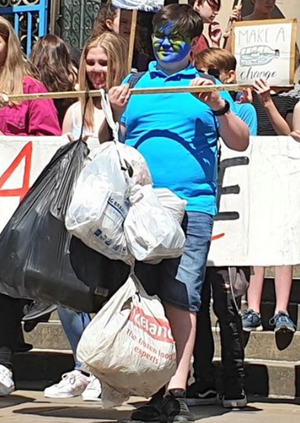
Perceiving Climate Change #4: Education
Greenwich Mean Time
This is a live-stream event
Tickets
Event Details
How can humans notice the subtle but fundamental processes of climate change? This online event will be the fourth in a series of free events across 2024 in which we will examine from a range of perspectives how people are striving to make climate change intelligible to human senses and cognitive processes. Our series of events examines how educators, scientists, artists and others find ways to detect and narrate changes in the realms of ice, water and heat and to inspire climate action. For our fourth session we will concentrate upon how the ways in which we detect and experience climate change’s is intertwined with teaching and learning. Hosted by the Sheffield Hallam University Space & Place Group in conjunction with the Royal Geographical Society (Yorkshire & North East Regional Committee), this series of events will foster an exploratory, interdisciplinary conversation and we very much welcome participation from all disciplines.
Our presenters will be:
“You can’t have healthy people on a sick planet” –
inspiring climate action through the health lens
Dr Rammina Yassaie, Medical Doctor and Senior Lecturer in Leadership, Centre for Leadership in Health and Social Care, Sheffield Hallam University
We all, as humans, care about our health. We also care deeply about the health of our friends, families and communities. This is the ‘why’ of the work. Whilst climate scientists have been calling for urgent action for decades, the health voice has begun to grow exponentially over recent years to evidence the need for climate action, climate leadership and climate advocacy in the name of human health. This talk will explore the interdependent nature of human health and planetary health and will examine the role that health professionals and patients (all of us!) have in ensuring the health messaging around the climate crisis is central to the call for action required. It will highlight that whilst the climate crisis is a health crisis, it is also a profound opportunity for health creation.
What does quality climate change education look like?
Lee Jowett, Climate Change and Sustainability Fellow, Sheffield Institute of Education Research and Knowledge Exchange Centre, Sheffield Hallam University
Education plays a crucial role in shaping future generations' understanding and action towards climate change, yet we see a board range of approaches within and between our education system in the UK. We will explore, using real life examples, what quality climate education looks like, drawing on research informed practice. From integrating sustainability practices into the curriculum to fostering a sense of environmental stewardship among students, I hope in this session will provide a ‘concerned hope’ for the future, ensuring young people of today have the skills, knowledge, and positive hope for change.
Ego-to-Eco: environmental stewardship, creativity, and community in higher education
Dr Elizabeth Freeman, Senior Lecturer in Wellbeing & Personal Growth, Sheffield Hallam University; Joanna Rucklidge, Senior lecturer in Visual Communication, Sheffield Hallam University; Dr Kaley Kramer (formerly Head of English, History, and Creative Writing, Sheffield Hallam University)
Elizabeth Freeman (Eco-psychologist) and Joanna Rucklidge (Visual Communication) created the ‘Eco to Ego’ project in 2016 out of a desire to engage in cross-disciplinary and transformative educational research to create a new way of engaging undergraduate (levels 4-6) students with nature, the environment, and wellbeing whilst also enhancing the student experience. The project responded to increasing environmental degradation and climate change as well as escalating mental health issues amongst the student and general population in the UK. Originally focused on provoking a psychological transformation among a group of Visual Communication students; it was adapted by Kaley Kramer (English) for final year (level 6) English students exploring ecology, climate change, and literature. As a pedagogical tool, Ego to Eco offers an opportunity for individuals to pause and reflect in ‘nature’, to attend to internal and external environments in a creative way, to develop confidence in individual observation, and to situate the self in communities of practice and care. This introduction will set out the research and practical applications of the Ego to Eco model and explore early results as well as case studies from psychology, visual arts, and literature undergraduate teaching.
Responsible Global Citizen: Collaborative Online International Learning
John Grant, Senior Lecturer, Sheffield Business School & Bee Gan, Head of Global Academic Development, Sheffield Hallam University
Higher education is crucial in preparing graduates to become responsible global citizens. Becoming a responsible global citizen requires key skills that enable individuals to actively address global challenges and promote positive change. These include intercultural communication, global awareness, collaboration & teamwork, ethical decision-making, environmental consciousness etc.
Hallam COIL (Collaborative Online International Learning): The Carbon Literacy and Climate Action Project was developed in the Directorate of Global Development and Partnerships to support departments in preparing students to become responsible global citizens. The framework can be used as an extracurricular programme or, ideally, embedded in an existing module. We will showcase both examples in the session.
